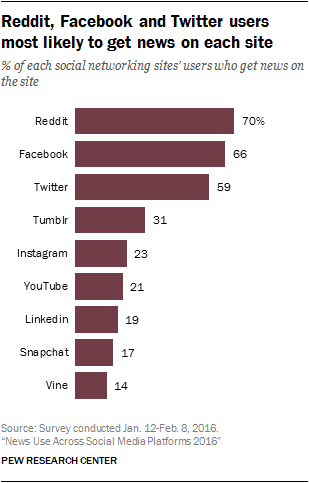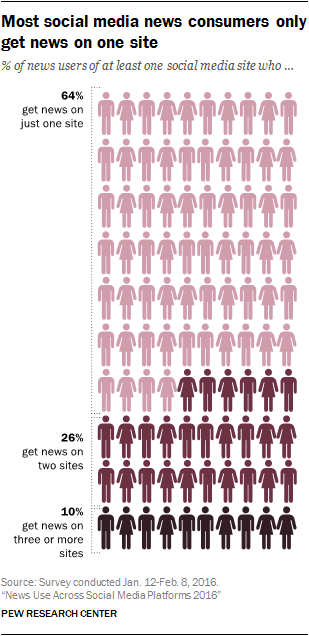Social media has greatly increased the capacity for mass communication of news, ideas, and data. However, these social networks allow users to censor the information with which they come into contact. This often one-sided communication has resulted in the emerging of an incredibly hostile political climate that allows users to subconsciously, or even consciously, edit, out of their news stream, information they disagree with and subsitute in what they think to be true.

Social media is how most U.S. adults get their news
Before analyzing or defining social media’s actual impact on politics, it is important to recognize that social media as a news source rather than merely a social networking tool is growing increasingly prominent among dozens of millions of Americans.
According to a new survey done by Pew Research Center conducted January 2016, a majority of U.S. adults – about 6-in-ten – get their news from social media, and 18% of adults get their news from social media often. 66% of Facebook users, 70% of Reddit users, and 59% of twitter users say they get most of their news from their preferred website, and the news/information/data reach of most other popular sites rests at about a fifth or less of their user bases.

People seek information that confirms their worldview
Pew Research studies show that people searching for information will choose that which confirms or supports their worldview over any news source expressing contrary views; thus, they often choose sources which, though they may make you feel secure in your beliefs are, quite frequently, factually incorrect.
According to Karen North, recognized expert in social psychology and Clinical Professor of Communication and Director of Digital Social Media:
“Psychological research shows that people really want confirmatory information. Not only do they want to know what’s up, they want to have opinions, and they want to find like-minded people to tell them why their opinion is correct. It doesn’t mean the people won’t change their opinion, but it feels better to find people who are supporting you and telling you why your opinion is right.”
Furthermore, according to Vincent Raynauld, assistant professor of communication studies at Emerson College in Boston:
“Even though social media allows people to be exposed to different political views, people tend to be part of environments where their political opinions are constantly reinforced […] Social media democratizes information sharing, and it helps individuals with very narrow interests quickly and easily connect with others who share their beliefs […] Sensational headlines and memorable memes give rapid-fire politics momentum on social media”
Even more impressive and perhaps dismaying are the statistics for the recent 2016 election. According to a Pew Research study done over 3,760 adults, 35 percent of people 18 to 29 years old say social media is the most helpful source of information on the 2016 presidential election. The exponentially expanding influence of social media, on millennials especially, cannot be overstated.
Social media serves as a unique platform to engage in disrespectful and angry arguments.
Yet another 2016 study from Pew Research center finds that more than one-in-three social media users feel worn out by the amount of politically charged content they encounter, and over half describe interactions they have over social media with those they disagree with as stressful or frustrating. According to this same study, a substantial number of users feel that these media platforms are unique venues for engaging in angry or disrespectful debate, and 44% feel they “agree strongly” with the idea that people discussing politics, among other contentious social issues, aggressively type statements that they would never say in a face-to-face interaction.
Furthermore, around half the user base views debates over social media as angrier (49%), less respectful (53%) and less civil (49%) than face-to-face interactions.
Activism on social media decreases the likelihood that users will participate in government
Social media negatively impacts individual’s participation in government elections through mainstreamed and politically-charged propagation. Though an effective method of dissemination of information, it is important to remember that sharing, retweeting, liking statuses, and reposting is not the same as getting physically involved in the political climate. It is still necessary to engage in authentic activism, which can even be as simple as voting.
Kei Kawashima-Ginsberg, the director of CIRCLE, the Center for Information and Research on Civic Learning and Engagement, at Tufts University points out that many young people just don’t vote reliably when compared to their elders. Further analysis from Pew Research Center shows that though millennials wield great potential political clout, they have the lowest voter turnout percentage of any other generational group.
Exit polls from both Fox news and CNN from the 2014 midterm elections show that only 13% of all voters were millennials, in spite of the fact that they make up 31% of the electorate.
Hashtagging and reposting can give one the illusion of participation in civic engagement, but nothing can replace the real thing.
Social media narrows users’ worldview

64% of social media users get their news from only a single source. 26% get it from two sources, and only 10% get it from three or more sources. Limiting one’s perspective on an issue damages the way in which one views a political opponent, for over a screen it is easier to consider someone an enemy or adversary rather than a fellow American. Just ask any political page that calls men and women of the opposing party a “bigot,” “racist,” “libtard,” “homophobe,” or any other slur without an ounce of evidence, merely operating under the assumption that since they are of an opposing viewpoint they must be an evil or morally unsound person. Pages like these do a great disservice to you and other members of their consumer bases when they so brazenly exclaim such harsh rhetoric without evidence.
To demonize any political opponent is intellectually dishonest, but social media sites give one free reign to do so. So in light of the evidence and today’s social-media-centric political environment, diversify your information hubs and surround yourself with fact-espousing sources rather than rhetoric-espousing ones. Finally, above all, take personal responsibility for the information you choose to endorse and consume.





